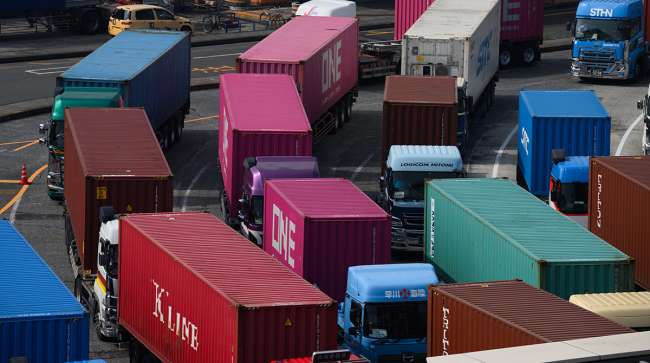Panorâmica da evolução recente das tarifas
O impacto potencial do adiamento das implementações de tarifas na logística global e nas redes de comércio é um tópico que vale a pena examinar. As tarifas, que funcionam como impostos sobre bens importados, podem alterar significativamente o cenário para empresas e consumidores.
A Mudança no Cronograma Tarifário
No final de julho, foram feitas alterações notáveis em relação às novas tarifas a serem aplicadas. Uma ordem que deveria ser assinada em 1º de agosto teve o cronograma adiado em uma semana para finalizar a tabela de tarifas que afeta 66 nações, incluindo importantes parceiros e regiões comerciais, como a União Europeia e Taiwan. Este ajuste pode ser crucial para as negociações que permanecem incompletas, infundindo uma sensação de incerteza no comércio global.
Impacto nas Relações Comerciais
Alterar a data de início das tarifas pode induzir um efeito cascata nas relações comerciais internacionais. Os países que recebem as tarifas podem encontrar novos motivos para negociação, pois ganham tempo para as discussões. A incerteza que se segue a tais mudanças mantém as empresas em alerta, levando muitas vezes à hesitação nas decisões de investimento e produção. As empresas que dependem de transporte e logística atempados também podem precisar de reavaliar as suas cadeias de abastecimento e estruturas de custos.
A Resposta das Empresas
Na preparação para essas mudanças, muitas empresas manifestaram suas preocupações sobre a potencial tensão financeira causada pelas tarifas. Corporações como a Ford, por exemplo, projetaram perdas substanciais em seus lucros devido aos impostos de importação, indicando o impacto generalizado que as tarifas podem ter na lucratividade e nas estratégias operacionais. Aqueles envolvidos em logística devem se adaptar a um ambiente em rápida mudança, recalibrando seus planos para gerenciar os custos de forma eficaz.
Atrasos nas Aplicações de Tarifas
A extensão da data de introdução das tarifas também levanta questões sobre a legitimidade do processo regulatório. À medida que os desafios legais pairam sobre a autoridade exercida para impor essas tarifas, as empresas de logística devem navegar por um cenário repleto de ambiguidades. Tais incertezas podem levar a aumentos nos atrasos de remessa, mudanças nas expectativas do mercado e, por fim, um cenário de gerenciamento da cadeia de suprimentos mais complexo.
Consequências Econômicas Potenciais
Um dos riscos mais significativos associados a novas tarifas é a chance de preços inflacionados em bens importados. Como as tarifas normalmente aumentam o custo de matérias-primas e outros itens essenciais, as empresas podem se ver lutando com o aumento dos custos operacionais, o que pode afetar os consumidores. Os economistas expressam preocupações sobre o potencial dessas tarifas para aumentar a inflação, sobrecarregando, assim, os orçamentos familiares.
Ajustes Logísticos
Com a perspectiva da inflação em conta, os profissionais de logística e as empresas precisam se preparar também para mudanças nas estratégias de preços. As empresas geralmente precisam considerar fornecedores alternativos ou mudar suas estratégias de fornecimento para mitigar os efeitos das tarifas em seus resultados financeiros. Gerenciar a logística de forma eficiente torna-se vital para as empresas permanecerem competitivas no ambiente econômico instável.
Implicações para o Planejamento Futuro
Os incidentes em torno das mudanças tarifárias sublinham um ponto: o planejamento preventivo é essencial. As empresas que operam em logística, distribuição ou remessa devem se manter informadas sobre os novos regulamentos e, ao mesmo tempo, ser ágeis o suficiente para adaptar a estratégia quando necessário. Essa flexibilidade é onde plataformas como GetTransport.com excelente, pois oferecem soluções de transporte de carga confiáveis e globais, adequadas para diversas necessidades.
Como a GetTransport.com Atende às Necessidades de Logística
Com sua gama de serviços, incluindo mudanças de escritório, entregas de carga e transporte de itens volumosos, GetTransport.com torna a logística mais gerenciável para empresas que competem para se ajustar às alterações tarifárias de forma eficiente. Os preços são projetados para serem acessíveis, garantindo que as organizações possam planejar seus movimentos de carga sem surpresas orçamentárias. A versatilidade deste serviço não só reforça as operações de logística, mas também melhora a resiliência geral da cadeia de suprimentos.
Conclusion and Future Perspectives
O recente atraso nas implementações de tarifas significa uma história em desenvolvimento com amplas implicações para empresas, consumidores e relações internacionais. As complexidades envolvidas em lidar com tarifas exigem que as empresas manobrem com perspicácia e adaptabilidade. À medida que a logística global continua a evoluir, ter um parceiro confiável como GetTransport.com pode facilitar soluções de remessa e cadeia de suprimentos mais tranquilas. As empresas são incentivadas a permanecerem proativas e bem informadas ao navegarem pelas mudanças contínuas que afetam suas operações.
Em resumo, mesmo as notícias e análises mais abrangentes não podem substituir o valor da experiência em primeira mão no cenário da logística. Ao utilizar os serviços oferecidos por players estabelecidos e emergentes no mercado, você pode tomar decisões informadas sobre suas necessidades de transporte, evitando custos ou frustrações desnecessárias. Aproveite os preços competitivos e a transparência fornecidos por GetTransport.com, melhorando tanto a conveniência quanto a confiabilidade em suas estratégias de logística. Comece a planejar sua próxima entrega e proteja sua carga com GetTransport.com.

 Efeitos da Demora nas Tarifas sobre o Comércio Global e a Logística">
Efeitos da Demora nas Tarifas sobre o Comércio Global e a Logística">